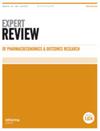偏好研究在健康预防方面未得到充分利用。
IF 1.5
4区 医学
Q3 HEALTH CARE SCIENCES & SERVICES
Expert Review of Pharmacoeconomics & Outcomes Research
Pub Date : 2025-08-17
DOI:10.1080/14737167.2025.2548279
引用次数: 0
摘要
简介:偏好研究是塑造有效的以患者为中心的预防保健策略的关键。预防措施,如接种疫苗。筛查和主动治疗无症状的高风险疾病,旨在减少未来的健康风险,通常是在健康个体中。在这些情况下,了解患者的偏好对于确保干预措施在临床上有效、可接受和可操作至关重要。在制定预防策略时,如果不考虑患者的偏好,可能会导致预防方案的接受度和依从性较低,最终限制其对患者和人群健康的影响。本文章由计算机程序翻译,如有差异,请以英文原文为准。
Preference research is underutilized in health prevention.
Introduction: Preference research is crucial in shaping effective patient-centered preventive healthcare strategies. Preventive measures such as vaccinations, screenings, and proactive treatment of asymptomatic high-risk conditions aim to reduce future health risks, often in healthy individuals. Understanding patient preferences in these contexts is vital to ensure that interventions are clinically effective, acceptable, and actionable. Failing to consider patient preferences when developing preventive strategies may result in low uptake and adherence to prevention programs, ultimately limiting their impact on patient and population health.
求助全文
通过发布文献求助,成功后即可免费获取论文全文。
去求助
来源期刊

Expert Review of Pharmacoeconomics & Outcomes Research
HEALTH CARE SCIENCES & SERVICES-PHARMACOLOGY & PHARMACY
CiteScore
4.00
自引率
4.30%
发文量
68
审稿时长
6-12 weeks
期刊介绍:
Expert Review of Pharmacoeconomics & Outcomes Research (ISSN 1473-7167) provides expert reviews on cost-benefit and pharmacoeconomic issues relating to the clinical use of drugs and therapeutic approaches. Coverage includes pharmacoeconomics and quality-of-life research, therapeutic outcomes, evidence-based medicine and cost-benefit research. All articles are subject to rigorous peer-review.
The journal adopts the unique Expert Review article format, offering a complete overview of current thinking in a key technology area, research or clinical practice, augmented by the following sections:
Expert Opinion – a personal view of the data presented in the article, a discussion on the developments that are likely to be important in the future, and the avenues of research likely to become exciting as further studies yield more detailed results
Article Highlights – an executive summary of the author’s most critical points.
 求助内容:
求助内容: 应助结果提醒方式:
应助结果提醒方式:


